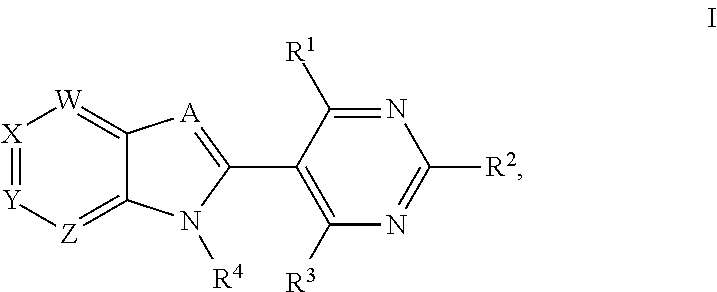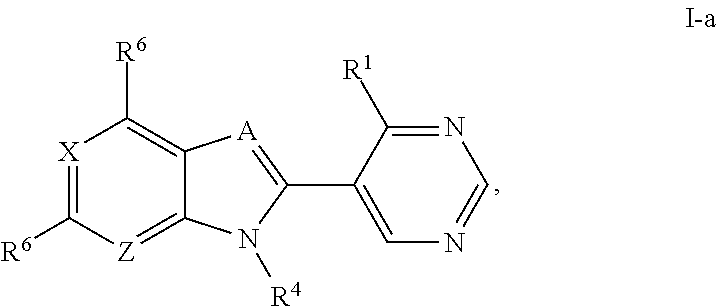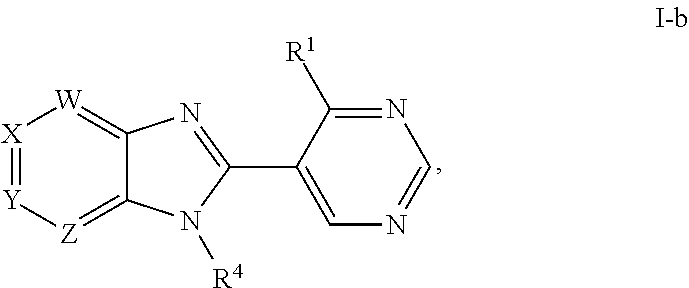Metalloenzyme inhibitor compounds
a technology of enzyme inhibitors and compounds, applied in the field of metaloenzyme inhibitor compounds, can solve the problems of reducing the activity of enzymes, and contributing to harmful effects at levels
- Summary
- Abstract
- Description
- Claims
- Application Information
AI Technical Summary
Benefits of technology
Problems solved by technology
Method used
Image
Examples
example 1
[0415]
N-(2-(Cyclopropylamino)-4-fluorophenyl)pyrimidine-5-carboxamide
[0416]To a stirred solution of N1-cyclopropyl-5-fluorobenzene-1,2-diamine Int-1 (300 mg, 1.81 mmol) in N,N-dimethylformamide (DMF) (3 mL) under an inert atmosphere was added pyrimidine-5-carboxylic acid (224 mg, 1.81 mmol), HATU (824 mg, 2.17 mmol) and ethyldiisopropylamine (1.26 mL, 7.23 mmol) at room temperature. The reaction mixture was stirred at room temperature for 8 h. After consumption of starting material (by TLC), the reaction mixture was diluted with water (30 mL) and extracted with EtOAc (2×40 mL). The combined organic extracts were dried over anhydrous Na2SO4 and concentrated under reduced pressure. The crude material was purified by silica gel column chromatography (eluent: 40% EtOAc / hexane) to afford N-(2-(cyclopropylamino)-4-fluorophenyl)pyrimidine-5-carboxamide (210 mg, 0.77 mmol, 41%) as dark brown solid.
[0417]1H NMR (400 MHz, DMSO-d6): δ 9.77 (s, 1H), 9.34 (s, 1H), 9.28 (s, 2H), 7.14 (dd, J=8.5, ...
example 2
[0423]
1-Cyclopropyl-6,7-difluoro-2-(pyrimidin-5-yl)-1H-benzo[d]imidazole (Ex. 2)
[0424]To a stirred solution of N1-cyclopropyl-5,6-difluorobenzene-1,2-diamine Int-2 (200 mg, 1.09 mmol) in DMF (2 mL) under an inert atmosphere was added pyrimidine-5-carbaldehyde (129 mg, 1.19 mmol), oxone (198 mg, 1.3 mmol), and water (0.2 mL) at room temperature. The reaction mixture was stirred at room temperature for 3 h. After consumption of starting material (by TLC), the reaction mixture was quenched with water (20 mL) and stirred for 10 min. The precipitated solid was filtered, washed with n-hexane (2×7 mL) and dried under vacuum to afford 1-cyclopropyl-6,7-difluoro-2-(pyrimidin-5-yl)-1H-benzo[d]imidazole Ex. 2 (90 mg, 0.33 mmol, 30%) as a white solid.
[0425]1H NMR (400 MHz, DMSO-d6): δ 9.38 (s, 2H), 9.36 (s, 1H), 7.60-7.55 (m, 1H), 7.39-7.30 (m, 1H), 4.11-4.03 (m, 1H), 1.13-1.06 (m, 2H), 0.85-0.79 (m, 2H).
[0426]LC-MS: m / z 272.9 [M+H]+ at 2.75 RT (97.90% purity).
[0427]HPLC: 99.01%.
example 3
[0428]
1-Cyclopropyl-2-(pyrimidin-5-yl)-1H-benzo[d]imidazole-6-carbonitrile (Ex. 3)
[0429]To a stirred solution of 4-amino-3-(cyclopropylamino)benzonitrile Int-4 (100 mg, 0.58 mmol) in DMF (3 mL) under an inert atmosphere was added pyrimidine-5-carbaldehyde (62 mg, 0.58 mmol), oxone (108 mg, 0.69 mmol), and water (0.2 mL) at room temperature. The reaction mixture was stirred at room temperature for 4 h. After consumption of starting material (by TLC), the reaction mixture was diluted with saturated potassium carbonate solution (20 mL) and extracted with EtOAc (2×20 mL). The combined organic extracts were dried over anhydrous Na2SO4 and concentrated under reduced pressure. The crude material was purified by silica gel column chromatography (eluent: 100% EtOAc) to afford 1-cyclopropyl-2-(pyrimidin-5-yl)-1H-benzo[d]imidazole-6-carbonitrile Ex. 3 (70 mg, 0.27 mmol, 47%) as an off white solid.
[0430]1H NMR (400 MHz, DMSO-d6): δ 9.45 (s, 2H), 9.38 (s, 1H), 8.31-8.29 (m, 1H), 7.92 (dd, J=8.3,...
PUM
| Property | Measurement | Unit |
|---|---|---|
| enantiomeric excess | aaaaa | aaaaa |
| enantiomeric excess | aaaaa | aaaaa |
| enantiomeric excess | aaaaa | aaaaa |
Abstract
Description
Claims
Application Information
 Login to View More
Login to View More - R&D
- Intellectual Property
- Life Sciences
- Materials
- Tech Scout
- Unparalleled Data Quality
- Higher Quality Content
- 60% Fewer Hallucinations
Browse by: Latest US Patents, China's latest patents, Technical Efficacy Thesaurus, Application Domain, Technology Topic, Popular Technical Reports.
© 2025 PatSnap. All rights reserved.Legal|Privacy policy|Modern Slavery Act Transparency Statement|Sitemap|About US| Contact US: help@patsnap.com



